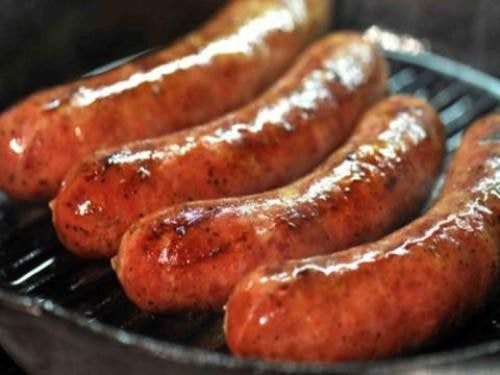6 foods to avoid if you don't want to get cancer
If you do not want cancer to visit, women should avoid eating the following foods.
No food is completely guaranteed to prevent cancer, but researchers still give reasonable dietary advice to prevent cancer.
According to scientists at the Physicians Committee for Responsible Medicine, a diet close to vegetarianism is a good way to prevent cancer. High in fruits and vegetables, and low in alcohol, dairy, and processed meats, can reduce the risk of cancers of the mouth, lung, breast, and colon.
1. Avoid or limit dairy foods to reduce the risk of prostate cancer
Research shows that consuming 35 grams of milk protein per day, equivalent to 1.5 cups of cheese, increases the risk of prostate cancer by 32%. Drinking 2 glasses of milk per day increases the risk by 60%.
Note: Taking calcium supplements still has the same effect as drinking normal milk. Men who consume more than 400 mg of calcium per day will have a 51% higher risk of prostate cancer.
2. Avoid or limit alcohol to reduce the risk of cancers of the mouth, throat, larynx, esophagus, colon, rectum, and chest
Drinking alcohol once a week increases the risk of mouth, throat and larynx cancer by 24%. Two to three drinks a day increases the risk of colon cancer by 21%.
Note: Alcohol itself (rather than preservatives) appears to be the cause of cancer, and any alcoholic beverage is harmful.
3. Avoid processed meat and red meat to reduce the risk of bowel cancer
Every 50g portion of processed meat, equivalent to two rashers of bacon or a sausage link, increases the risk of bowel cancer by 21%. Every 120g portion of red meat a day, equivalent to a small steak, increases the risk of bowel cancer by 28%.
Note: The excess of essential amino acids and the amount of heterocrylic amine, nitrite and heme iron in processed meat and red meat are believed to influence the growth of cancer cells in the body.
 |
| Eating one sausage link increases the risk of bowel cancer by up to 21%. |
4. Avoid grilled and fried meats to reduce the risk of bowel, breast, prostate, kidney and pancreatic cancers
Four heterocyclic amines (HCAs) have been linked to colon cancer. HCAs are formed from creatine and amino acids in the shoulder meat during cooking, increasing with cooking time and temperature. When ingested, HCAs can disrupt DNA synthesis.
Note: In addition to the cancers listed above, HCAs also have an effect, albeit weaker, on breast, prostate, kidney, and pancreatic cancers.
5. Consuming soy products reduces the risk, recurrence and death from breast cancer
Research from Asian and Western countries shows that soy milk products help reduce the risk of cancer. Adult women in China who consume more than 11.3 grams of soy protein daily, equivalent to half a cup of cooked soybeans, reduce the risk of premenopausal breast cancer by 43% compared with those who consume only 1.7 grams.
A study in Shanghai found that women with breast cancer who consumed 11 grams of soy protein a day could reduce their mortality and recurrence by about 30%. A study in the US showed similar results: the more soy isoflavones women consumed, the lower their risk of death and recurrence of breast cancer.
Note: When choosing soy products, opt for natural varieties, such as edamame (a Japanese soybean), tempeh (a fermented soybean product) or organic tofu, instead of the concentrated protein found in powders and supplements.
6. Eating lots of fruits and vegetables reduces your risk of many common forms of cancer.
Fruit and vegetables, especially leafy greens, help reduce the risk of cancer overall. Eating lots of cruciferous vegetables such as broccoli, kale and cabbage can reduce the risk of bowel cancer by 18% and reduce the risk of lung and stomach cancer.
Women who consumed the most carotenoid-rich vegetables, such as carrots and sweet potatoes, reduced their risk of breast cancer by 19%. Overall, women who consumed the highest amounts of any fruit or vegetable reduced their risk of breast cancer by 11%.
Eating lots of tomatoes reduces the risk of stomach cancer by 27%. Garlic and allium vegetables such as onions, significantly reduce the risk of stomach cancer while a Western diet (high in meat and fat but low in vegetables and fruit) doubles the risk.
Note: Certain ingredients in soybeans, green tea, turmeric, tomatoes, and other foods may regulate the natural process of breaking down unhealthy cells, an important factor in cancer prevention.
According to Zing.vn






